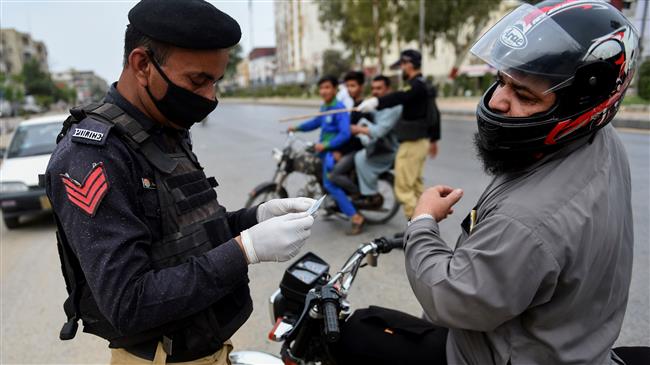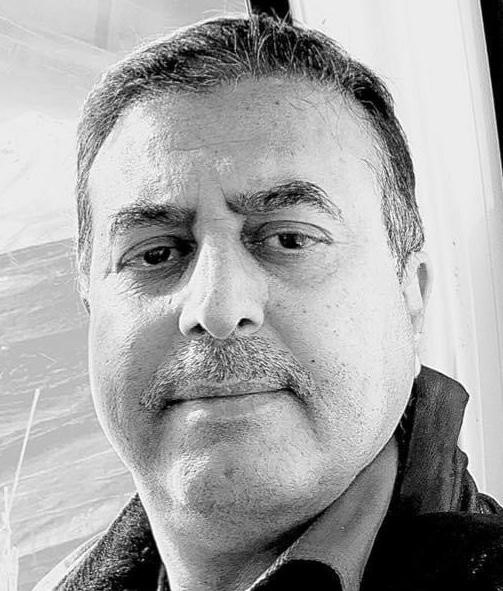Policing the pandemic
Dr Tariq Rustam
“Mano”, I called my cat. She did not move and kept sitting at a distance. Her meow in response sounded like ‘nooo corona’. She too appears to be scared and prefers to maintain social distancing.
Such is the level of alarm that people are locked down, friends have stopped shaking hands, brothers have stopped hugging, and mothers have stopped kissing their kids. People are working from home, party goers are squirming in their lounge sofas and the women folk are not going out even for shopping.
The fear of corona has possessed us all like an ancient demon. Lo and behold I have seen some people, apparently men and women, working day and night, not from home, not in some posh offices but in highly risky environments where the likelihood of not catching virus is next to impossible. As if they are immortals whom death will not touch. Who are they? I asked Mano. Guess? They are in uniform, she meowed again: they are doctors, nurses, army and the most slammed and slated of all the people in Pakistan-the police. Don’t you know man? It was a nudge that awakened me to think.
Dealing with the crisis is nothing new to police. Here they are fighting serious crime, encountering with hardened criminals in hot pursuit and risking their lives: there they are patrolling and picketing the dust and smoke filled roads to ensure security of citizens in every kind of weather and putting their health in jeopardy. Handling mob situations is yet another challenge they face. But dealing with a pandemic of a deadly disease is something really new for the police.Along with running after criminals they are now looking for corona suspects as well.
The police spying network these days is more engaged in tracking the corona suspects than the criminals and terrorists. Once a suspect is found out they have to ensure he is isolated and tested. Then they conduct a detailed interview to track people whom he has met in recent days. Apart from exposing themselves to the risk of catching infection, they are facing resistance from the person they put under isolation. Just a few days ago an SHO was stabbed by a tablighidogmatist on his insisting for corona test and isolation.
Whereas the people are enjoying a kind of vacations and protection against disease inside their houses, the police are burdened with the responsibility to enforce the lockdown. This has put an extra strain on already overburdened and resource constrained police department.In the given situation police need to prioritize certain functions over the other and define their core functions during the pandemic keeping in view the available man and material resources.This will help them give their best in the war against the hidden enemy.
For instance, the routine functions of police, like investigations and arrests etc, may be taken on slow track. This will benefit the police in many ways: they will be able to spend more of their available policing time and resources on enforcing the lock down, tracking and isolating corona suspects and helping the health system when and where required. This will also save them from unnecessary exposure to the virus in the process of raids and arrests.
The police forces across the world are already doing this; the arrest rate of Los Angeles police has dropped by 80% during the last week and this holds true for other forces as well in varying degrees. Similarly, action on petty crime calls is being postponed for the time being. This policy will also reduce the pressure on prisons where social distancing cannot be maintained and health and hygiene conditions are particularly poor. Rationalizing the work load will go a long way in forestalling the possibility of absenteeism which is highly probable in such like situations because of disease or fear of disease, stress, trauma and breakdown in morale.
Reducing raids and arrests will be useful for sure but respite for the police remains an illusion as interacting with potentially infected people on the roads to enforce the lockdown put them in greater threat of getting infected. The situation is even more dangerous given that there is general shortage of personal protective equipment, masks, sanitizers. For police social distancing is a luxury they cannot afford. The field officers have to travel in police vans sitting side by side and sometime with the criminals they arrest. Their barracks in the police station are generally overcrowded and can cause the spread of disease.
The importance of daily disinfection of the vehicles and the living spaces in this situation cannot be overemphasize. Under the circumstances it would be wiser if the officers are allowed to go to their homes instead of staying in the barracks till the threat is over. In their vans the officers should maintain a safe distance from one another.
So far the situation within the department is not worrisome and reported cases of infection are few and far between.However, the police leadership needs to be sentient that God forbid if it spreads within the force there can be a panic situation. The morale of the force has to be maintained to keep them going with their missionary task. Vulnerable individuals and groups in the force need to be identified and especially looked after.
The deployment plan should be made in a way that vulnerable groups like the officers with 50 plus age or having chronic heart, lung or other problems are not sent on public dealing situations to minimize their exposure. Screening needs to be started in the department so that the effected officers are isolated at the earliest before they communicate the virus to their colleagues and other people they come in contact.
The police should keep their medical facilities geared up to deal with any emergency. Testing kits should be procured, isolation and quarantine facilities beefed up and a supply of necessary medicines ensured in case such a situation arises. Bracing for the worst would be wiser than indolently waiting for the crisis.
Look in the television, the police are offering guard of honour to the doctors, the cat meowed again to break my thinking spell. Probably she was suggesting who will give guard of honour to the police for their equally laudable service to the community in precarious and perilous times. Will their passion to save the people from the insidious ailment without caring for their own lives ever be recognized?
Going beyond the symbolism of guard of honour, they deserve some material reward as well. Why not a financial package, one-month salary for instance, as has been announced for the doctors? This, I think, will be a great morale booster for the drained and exhausted force sacrificing their self for the nation.
— The writer is a senior police officer and can be reached at [email protected]



